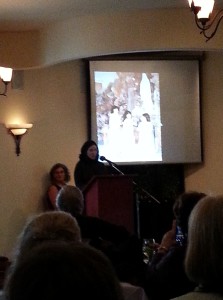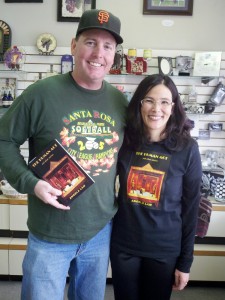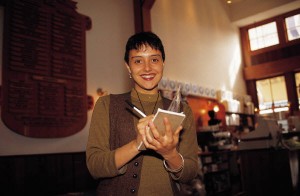
Leza Lowitz introduced me to her friend, David Bromige, at a poetry reading in Sebastopol. Although I had been attending Sonoma State University as a creative writing major, I had not taken Professor Bromige’s poetry classes because he was on sabbatical. He was an elegant gentleman with wavy salt and pepper hair, leathery sun-kissed skin, and bright, though penetrating, brown eyes. He was dressed in a tweed jacket, white button-down shirt, brown slacks and matching dress shoes. We started talking about poetry. I was labeled a narrative poet; he was labeled a language poet. But we both liked to bend genres, experiment, and come up with new twists to old turns. At the time I had completed my first chapbook of poems, Woman of Crystals, and had been promoting it through book festivals.
“What are you working on?” I asked him.
His brown eyes widened and his brow furrowed, as if puzzled by the question. “I’m in between work,” he said.
“What do you mean?” I asked. As a fellow writer, I imagined I would spend my sabbatical devoted entirely to writing my magnum opus, or at least, my next book to-be-published.
Professor Bromige grasped my elbow with his free hand (the other carried a glass of red wine) and led me away from the cacophony of others to a relatively quiet corner of the Quicksilver Mine Company. His voice was low and hoarse. “I’m laying fallow,” he said.
“Laying fallow?” I asked.
Professor Bromige began to explain how the farming concept of rotating crops applied to writing. “The mind is like a field,” he said. “You produce a great work of art and then you rest for a while.”
“But I always have ideas to work on,” I said. “I have so many ideas I can’t get to them all. I thought if I had time, like you do, I would be writing something new.”
That’s when he taught me a great lesson, a lesson I never learned in a classroom. “You should always rest between projects, let the ideas germinate. When they are ready to sprout, then you begin writing again. But no sooner. Always lay fallow. That’s what I am doing. I am laying fallow.”
“But when will you know when to begin again?” I asked.
He gazed off into the distance at nothing in particular and said, “However long it takes to complete a project is how long you should rest. That’s how nature works. That’s how writing works.”
At the time, I doubted the wisdom of his advice. If I didn’t have enough time to write, I most certainly didn’t have enough time to lay fallow. Besides, I didn’t have a paid leave of absence to do absolutely nothing. I had bills to pay and a body of work to complete before I died.
The evening ended with neither one of us understanding the other no matter how hard we politely tried. Unfortunately, I never saw Professor Bromige again. He retired shortly after his sabbatical and went on to publish ten more volumes of poetry before his death in 2009.
Although Professor Bromige is no longer with us, I finally understand what he was trying to say. I published my third novel in April 2011 and wanted to plunge immediately into my fourth novel. Although I have volumes of notes at the ready, everything I write falls flat. That’s when I realized it is time to lay fallow, to leave the words alone, to retire to other things, to let the mind grow fertile with rest.
It is a hard lesson to learn. Every morning I struggle with the guilt of “I should be writing” instead of sleeping in or jogging around the block. But I know, deep down, Professor Bromige is right. The mind is a field that needs rest. When the season is right, the words will germinate and grow into the next book to-be-published. Until then, I will be laying fallow.
More on David Bromige.
More on Leza Lowitz.






